Bernie Sanders distances himself from group backing his WH run
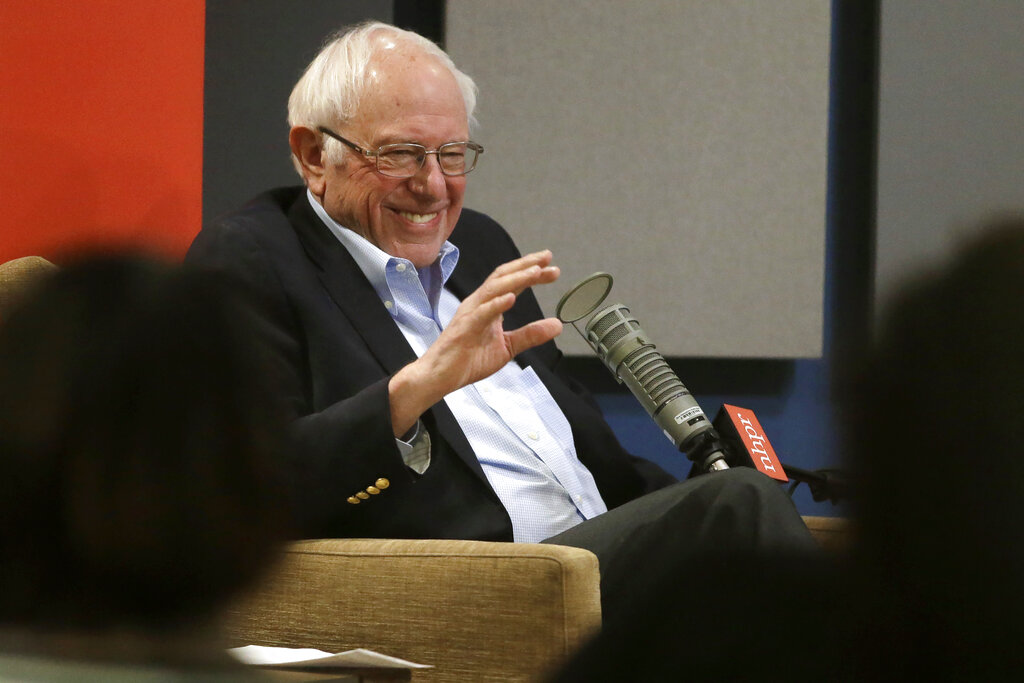
Sanders’ tax-exempt nonprofit functions much like a super PAC.
Outside groups deal themselves in for GOP delegate game

After burning through millions of dollars in a mostly failed attempt to sway Republican primary voters, big-money outside groups opposing Donald Trump have turned to a far smaller target audience: the delegates who will actually choose the presidential nominee. Our Principles, which is devoted to keeping Trump from winning, and super PACs backing Ted Cruz and John Kasich are spending their time and money researching the complex process of delegate selection and reaching out to those party insiders. None of the groups have put up ads for Tuesday’s New York primary. Delegates are the people – typically longtime Republicans and state party activists – who will have their say at the GOP convention this summer in Cleveland if Trump does not lock up the nomination first in the remaining voting contests. The hot pursuit of such low-profile people by outside groups is yet another unprecedented twist in a history-defying presidential primary season. The delegate focus comes after the groups’ earlier efforts turned out to be money not particularly well spent. GOP-aligned groups spent at least $218 million on presidential television and radio ads, according to advertising tracker Kantar Media‘s CMAG. In one example, last month Our Principles put $2.3 million into ads trying to persuade Florida voters to ditch Trump, but he won the state anyway. “At this stage, the delegate fight is the most important part of the race,” said Tim Miller, a spokesman for Our Principles. “The work we’re doing on it is how we get the biggest bang for our buck.” The Trump, Cruz and Kasich campaigns all pay specialists to help them with their own delegate strategy. Yet the outside groups can’t resist crafting a role for themselves. By law, candidates cannot direct their helpful super PACs on how to spend money on paid communications. However, candidates and the outside groups keep a close eye on what the others are doing. At a donor event last weekend at the Venetian casino resort in Las Vegas, pro-Cruz super PAC officials explained to a rapt audience how they are diving into data about Republican delegates. That super PAC event took place on the same floor as a Cruz campaign finance event, which delved into similar material. Douglas Heye, a former communications director for the Republican National Convention, said the organizational nature of a potential delegate fight plays into Cruz’s strengths. The Texas senator has cultivated relationships with conservative leaders across the country. Now they’re helping him woo delegates. “Cruz hasn’t done things in haphazard fashion,” said Heye, who opposes Trump but is otherwise unaligned. “It takes a real team and the hard work of surrogates and coalitions to succeed at mastering the process in all 50 states.” New Day for America, a super PAC backing Kasich, is “executing a delegate outreach strategy,” said spokeswoman Connie Wehrkamp. She declined to give details. — THE FREE AGENTS There are two phases to this fight for delegates. The first involves free agents in states where voters don’t have a say. Each time an anti-Trump delegate is selected, it gets a little harder for the front-runner to reach the 1,237 he needs to avoid a contested convention. Our Principles has keenly focused on these delegates, who hail from North Dakota, Colorado and Wyoming. The group began reaching out via online advertising back in February, Federal Election Commission filings show. It then worked the phones and mailed literature. Finally, at the state convention site in Colorado Springs last weekend, three of its paid employees and about a half-dozen volunteers distributed “voter guides” likening Trump to President Barack Obama. In both Colorado and North Dakota, Trump was shut out of delegates. Wyoming selects delegates this weekend. — POTENTIAL CONVERTS If Trump can’t win outright, most of the delegates who are initially pledged to him by state rules gain the freedom to vote at the convention for whomever they choose. That’s why the three candidates are looking to make friends with them. Incidentally, there are few rules limiting the ways candidates and outside groups can influence the delegates, Republican election lawyers say. So it’s easy to imagine a deep-pocketed super PAC paying for delegates’ accommodations in Cleveland and giving them other perks. Our Principles’ Miller said the group is assessing what it will do in this second phase of the delegate hunt. Another Trump opponent, the Washington group Club for Growth, has also at least temporarily stopped its TV ads. Spokesman Doug Sachtelben said that while it hasn’t done anything with delegates yet, “nothing is off the table.” Pro-Trump forces are also keen to get into the game. “We’re running ads and a data program to fill as many delegate slots as we can with delegates who like Trump,” said Jesse Benton, a spokesman for Great America PAC. The group has reported to the FEC its plans to spend more than $1 million in ads across the country – some aiming to whip up anger about a potential contested convention. “Donald Trump will have the most delegates by a wide margin, but the GOP establishment is determined to deny him the nomination in any way possible, even if it means a contested convention,” a narrator says in one. Callers are asked to give money to the super PAC as a show of support for Trump. Republished with permission of the Associated Press.
Cash-rich super PACs prolong flagging presidential campaigns
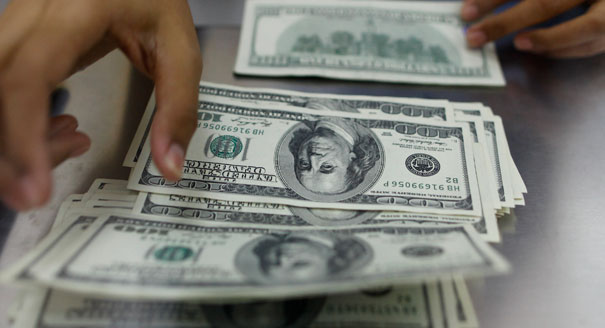
Jeb Bush‘s recent cancellation of advertising plans in Iowa and South Carolina was yet another cost-saving step for a down-in-the-polls presidential campaign that had already thinned its staff. If not for his flush super PAC, the Republican might be gone from the contest by now. That group, Right to Rise, has burned through half of its $103 million — which still leaves it with about as much cash as John McCain spent during the entire 2008 GOP nominating contest. In the 2016 race, money isn’t buying love from voters. It is, however, buying some candidates more time. Less than a month before voting begins, the Republican field is still thick with a dozen presidential hopefuls. Super PACs are one reason why. Like Bush, Chris Christie and John Kasich are leaning heavily on these outside groups to communicate with voters. Nearly 96 percent of the money for Bush, Kasich and Christie commercials has come not from their official campaigns, but from their supportive super PACs, according to advertising tracker Kantar Media’s CMAG. This is the second presidential campaign since super political action committees burst on the scene after the Supreme Court’s Citizens United decision. The 2010 case made it clear that donors can contribute unlimited amounts of money to groups supporting specific candidates, so long as the candidates don’t directly control the spending. That means that at any given time a wealthy admirer of a candidate can write a huge check to a super PAC to help keep that person in front of voters, through commercials and mailings. Some super PACs, including one for Carly Fiorina, even have campaign-like voter outreach efforts such as door-knocking and publicizing events that feature the candidate. Those super PAC investments work as an incentive against a candidate giving up too soon, however dim the prospects. While super PACs have dumped buckets of money into politics, they’ve also helped ensure a more competitive democratic process, said Bradley Smith, a former federal elections commissioner who advocates for looser fundraising restrictions. “The complaint used to be that the candidates would fold up before anyone even voted,” said Smith, founder and chairman of the Center for Competitive Politics. “It’s not a bad thing that’s not the case anymore.” One of the first presidential hopefuls to take advantage of the post-Citizens United campaign finance landscape was Newt Gingrich, the former House speaker who sought the 2012 GOP nomination. Las Vegas casino billionaire Sheldon Adelson put up $20 million of his family’s money to back his longtime friend Gingrich. That money paid for TV ads when the candidate couldn’t afford his own, helping him stay afloat through third-to-vote South Carolina, which he won. Rick Santorum was in a similar position, benefiting from Wyoming investor Foster Friess’s super PAC assistance until his candidacy took flight after a surprising Iowa win. “There’s no question that a super PAC gives you the ability to sustain the appearance of a campaign even if you can no longer raise money,” Gingrich told AP. Both eventually lost to Mitt Romney, who dominated traditional campaign fundraising and also had a big-money super PAC helping out. Gingrich said the 2016 race differs from 2012 in several crucial ways. “That was one guy with a bunch of money versus the rest of us, and now it’s a bunch of guys with a bunch of money,” he said. At the same time, a celebrity businessman and political newcomer has shown that “money may not matter as much,” Gingrich said. Donald Trump‘s campaign only recently made its first TV ad, putting up $2 million to air it this week in Iowa and New Hampshire. He has dominated the GOP contest without spending much campaign money, and without major help from super PACs — which he has decried as “disgusting.” Bush, a former Florida governor, is in roughly the opposite position: His super PAC Right to Rise has pumped more than $50 million into its advertising campaign, yet he remains in the single digits in most preference polls. The group is pressing ahead. It has booked at least $24 million more in ads over the next nine weeks in 10 states, including early voting Iowa, New Hampshire and South Carolina, CMAG shows. Over the weekend, Bush’s official campaign cuts its South Carolina advertising plan by half and pulled its Iowa ad reservations altogether, an Associated Press analysis of the CMAG data found. Kasich, governor of Ohio, just began airing his first television ad on Tuesday, according to the campaign. But his super PACs have been busy for months. They’ve showered New Hampshire viewers with almost $10 million worth of commercials and this week told federal regulators they’re buying more ad time and distributing pro-Kasich — and anti-Christie — literature to voters. Republished with permission of the Associated Press.
Super PACs dole out cash, whether candidates like it or not
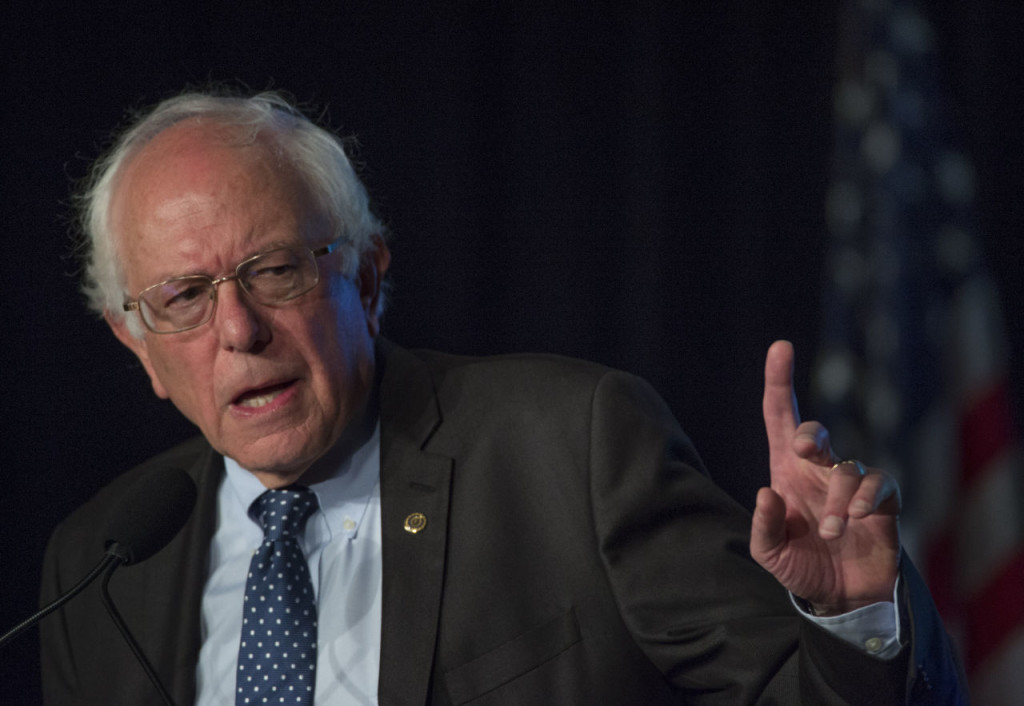
Donald Trump calls them a “crooked business.” Bernie Sanders says they’re “corrupt” organizations “buying elections.” But the barrage of insults hasn’t stopped the political groups known as super PACs and their donors from showing the two presidential candidates some love — no matter how loudly they may rail against their very existence. “I’m not going to be deterred just by that alone,” said Joshua Grossman, president of Progressive Kick, of Sanders’ anti-super PAC message. His liberal super PAC, funded by donors who have written checks as large as $250,000, has endorsed Sanders and is planning to spend money helping to elect him. Unlike formal campaigns for president, super PACs are allowed by law to accept donations of any size. That fact makes them a juicy political target for populist candidates such as Trump and Sanders. Yet already, a super PAC allied with a nurses’ union that endorsed Sanders over Democratic front-runner Hillary Clinton in August has put more than $600,000 into pro-Sanders digital and print ads in the important early primary states of Iowa, New Hampshire, South Carolina and Nevada. Billboards put up by the super PAC, National Nurses United for Patient Protection, proclaim: “Politics As Usual Won’t Guarantee Healthcare For All. Bernie Will.” The union is only able to spend that kind of money because of the 2010 Supreme Court ruling known as Citizens United, a decision that ultimately led to the creation of super PACs. Sanders has decried it as corrosive to democracy. That ruling also enabled unions to start spending member dues on political advertising in federal elections. Since that time, the nurses’ union has moved $3.4 million in dues into its super PAC, according to records filed with the Federal Election Commission. The group hasn’t raised money from anyone else. “Anti-labor folks might say that these unions are extorting money from their dues-paying members to use on politics, whether those members like it or not,” said Paul S. Ryan, senior counsel at the Campaign Legal Center in Washington, which advocates for stricter campaign finance rules. RoseAnn DeMoro, the union’s executive director, said the super PAC has helped other candidates in previous elections and is assisting Sanders’ bid because “we’ve never seen a better messenger” for causes important to the union’s members, citing as an example his plan to expand Medicare. “We are hoping to do as much as we can for him,” she said. “The nurses are extremely happy with what we’ve done with their money. He’s a vehicle for our voice. We laugh quietly among ourselves and say, ‘Bernie stole our issues.’” The nurses’ early endorsement was seen as a political victory for Sanders, who filmed a five-minute video thanking the group’s 185,000 members for their support. Nearly three months later, Sanders and his aides defended the group as “good” big money, drawing a contrast with the wealthy corporate donors he frequently vilifies on the campaign trail. “They are nurses and they are fighting for the health care of their people,” Sanders said in an interview last week on CNN. “They are doing what they think is appropriate. I do not have a super PAC.” Sanders has sought to distinguish himself from Clinton on the issue of big money. While both say they’d like to limit money in politics by rolling back the Citizens United court ruling, Clinton deployed close aides to a super PAC that aims to at least triple the $80 million it raised to support President Barack Obama‘s re-election. That group, Priorities USA, already has a half-dozen $1 million contributors. Sanders has not authorized any similar effort. In fact, in June, Sanders’ campaign attorney sent a cease-and-desist letter to a strategist who set up a “pro-Sanders” super PAC going by several names, including Bet on Bernie and Americans Socially United. Cary Lee Peterson, the man who set up the group, has credit and legal problems in several states, an investigation by the Center for Public Integrity found. A campaign finance report the group filed seven weeks late showed it was $50,000 in debt as of the end of June. The group is continuing to solicit money online. On the other side of the aisle, Trump accuses his opponents of being controlled by the super PACs backing their bids — even calling some “puppets” of their donors. But super PACs can’t seem to quit Trump. At one point his campaign identified nine that appeared to be raising money in the name of helping him. One, called Patriots for Trump, purchased Iowa and New Hampshire voter contact information as recently as late October, FEC records show. Trump himself attended a several events for a group called Make America Great Again — his slogan. In October, The Washington Post reported on ties between the leader of Make America Great Again and Trump’s own aides. Soon after, Trump asked the group to shut down, and they appeared to do so. At the same time, his campaign sent cease-and-desist letters to other supposedly pro-Trump super PACs, and he ramped up his anti-super-PAC rhetoric. Many seem to have stopped raising money. One group, called Let’s Trump Politics, remains operational — at least online. It formed in late September, according to the FEC, and hasn’t yet had to file any fundraising information. The group’s website includes a headline about how “Republicans support political outsiders” — and a disclaimer that its mission is “in no way a direct relation to Donald Trump or his 2016 presidential campaign.” Republished with permission of the Associated Press.
What does Jeb Bush get for $20 million in TV ad buys? Not much.

Jeb Bush and his supporters have spent more than twice that of any other candidate or outside group on TV ads in the 2016 presidential race. And what does the former Florida governor get for nearly $20 million, asks Mark Murray of NBC News. Apparently, not much. Bush’s poll numbers are currently languishing in the single digits both nationally and in the early primary states. Right to Rise, the pro-Bush super PAC, has made $19.5 million in ad spending for Iowa, New Hampshire and South Carolina. Murray notes that the campaign also spent another $438,000. In comparison, the 501c4 organization supporting fellow Floridian Marco Rubio – Conservative Solutions Project – paid half that amount, $8.4 million to date. Hillary Clinton’s presidential campaign, on the other hand, has spent $8.1 million, while her supporting Super PAC spent about $199,000. To put those numbers further in context, campaigns receive substantial discounts on TV ad time, whereas Super PACs and other outside groups may have to pony up to four times as much for similar ad space. Murray, along with NBC News partners SMG Delta, have calculated who spent what in the 2016 presidential ad wars – a not-quite-perfect way to measure winners of the secret advertising primary. Through Nov. 21, the leaders are Bush with $19.9 million ($19.5 million from Right to Rise Super PAC, $438K from campaign), followed by Rubio with $8.4 million (all from outside group Conservative Solutions Project), Clinton with $8.3 million ($8.1 million from campaign, $199K from Priorities USA Super PAC) and Ohio Gov. John Kasich with $7.3 million (all from two outside groups). After Kasich, comes New Jersey Gov. Chris Christie with $5.7 million ($5.3 million from America Leads Super PAC, $407K from campaign), Louisiana Gov. Bobby Jindal – who just dropped out of the race – with $3.3 million (all from outside groups), Vermont Sen. Bernie Sanders with $3 million (all from his campaign), South Carolina Sen. Lindsey Graham at $1.7 million ($1.6 million from Super PAC, $100K from campaign) and retired neurosurgeon Ben Carson with $1.5 million (all from his campaign). For the week of Nov. 15-21, the biggest spenders were Bush with $2 million, all from his Super PAC; Sanders with $940,000, all from his campaign; Clinton with $741,000, all from the campaign; Rubio with $619,000, all from Conservative Solutions; Kasich with $352,000, all from his supporting Super PAC New Day for America, Christie with $313,000, all from America Leads Super PAC; and Carson with $214,000, all of which came from his campaign.
Presidential Primary Brief: 407 days until Election Day
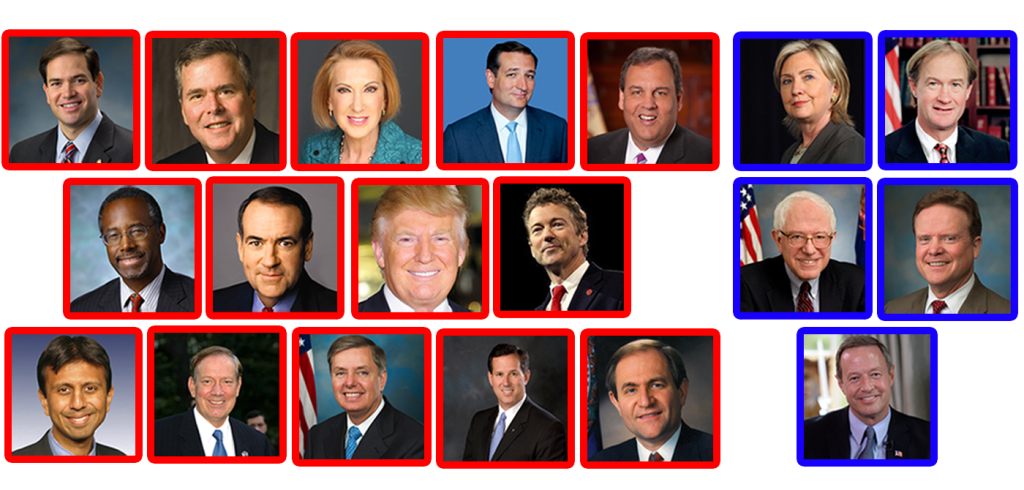
153 days until AL Presidential Primary 407 days until Election Day Convention Dates: Republican July 18-21 2016, Democratic July 25-28 2016 Weekly Headlines: 2016 debate calendar set Scott Walker drops out of 2016 presidential race Poll: Carson ties Trump; Biden draws from Clinton Press Clips: John Boehner’s resignation spells trouble for Jeb Bush (CNN 9/25/15) As if Jeb Bush needed another problem. House Speaker John Boehner’s abrupt resignation Friday — after an insurrection by grassroots activists infuriated at the failure of Washington Republicans to thwart President Barack Obama — was another bad omen for a campaign wilting amid anti-‐establishment fury. In the 2016 presidential race, outsiders are in, insiders are out and the messy power struggle that is splintering the GOP is going to make winning the nomination — and then capturing the White House — very tough for a party standard bearer like Bush. Billionaire Steyer calls for more Democratic debates (Politico 9/25/15) Billionaire Democratic donor Tom Steyer on Friday afternoon called on the party to add another debate focused on climate change and clean energy, adding his voice to a pitched disagreement over the number of Democratic debates. Steyer, an environmentalist who is one of the party’s major financiers and who already hosted a fundraiser for Hillary Clinton, said he wants the debate to occur before the Iowa caucuses in February. Donald Trump promises top of the line national security team (CBS News 9/22/15) Republican presidential frontrunner Donald Trump said on Monday that he’ll soon roll out a national security team that will be “top of the line.” “We’re going to be announcing something very soon,” Trump said Monday to conservative radio host Hugh Hewitt. “So many great national security people, including generals, have come to us and called us — and at the top level — and they want to be involved. And I think they like what I say about other things, also. But they want to be involved, and we have a great team in place, or shortly will be in place.” Third GOP debate sets off wave of anxiety (Politico 9/27/15) The uncertain terms of the next Republican debate are setting off a wave of anxiety among middle and bottom tier campaigns, with several lashing out at the Republican National Committee for failing to provide clarity on how many candidates will appear on stage. The campaigns fear the entry criteria for the Oct. 28 debate is being designed to reduce the number of candidates on stage for the third primetime debate — a life-or-death matter for White House hopefuls on the bubble. Biden backers seeking staffers for White House bid (US News 9/25/15) Advisers to Joe Biden are attempting to enlist staffers for a potential 2016 presidential campaign – the latest sign the vice president is inching closer to entering the race. A Democratic operative tells U.S. News he was approached this week about working for Biden if he pulled the trigger on a run. The operative also says Biden has already secured a fundraising consulting firm in order to quickly ramp up financing following a possible announcement. State Dept. to send Benghazi committee nearly 1,000 Clinton emails (Politico 9/25/15) The State Department announced Friday that it is sending the House Benghazi committee nearly 1,000 emails from Hillary Clinton’s private account — a batch three times larger than the set of Clinton messages her former agency sent to Capitol Hill back in May. A senior State Department official said the decision to provide the new set of about 925 emails is linked to Clinton’s expected testimony to the panel next month and to a clearer understanding by State officials that Congressional investigators want all Libya-‐related records, not just those involving security issues related to the deadly 2012 attack on U.S. facilities in Benghazi. Presidential super PACs push campaign limits (USA Today 9/22/15) When Donald Trump slammed Carly Fiorina’s looks recently, the response was swift: an online video that extols her face and that of other Republican women. The rebuke, however, didn’t come from Fiorina’s campaign, Carly for President. Instead, the video was the work of CARLY for America, a super PAC that has raised more than double Fiorina’s campaign haul but is barred from coordinating its spending with Fiorina.
Libertarian donors put up $6 million for Rand Paul GOP bid
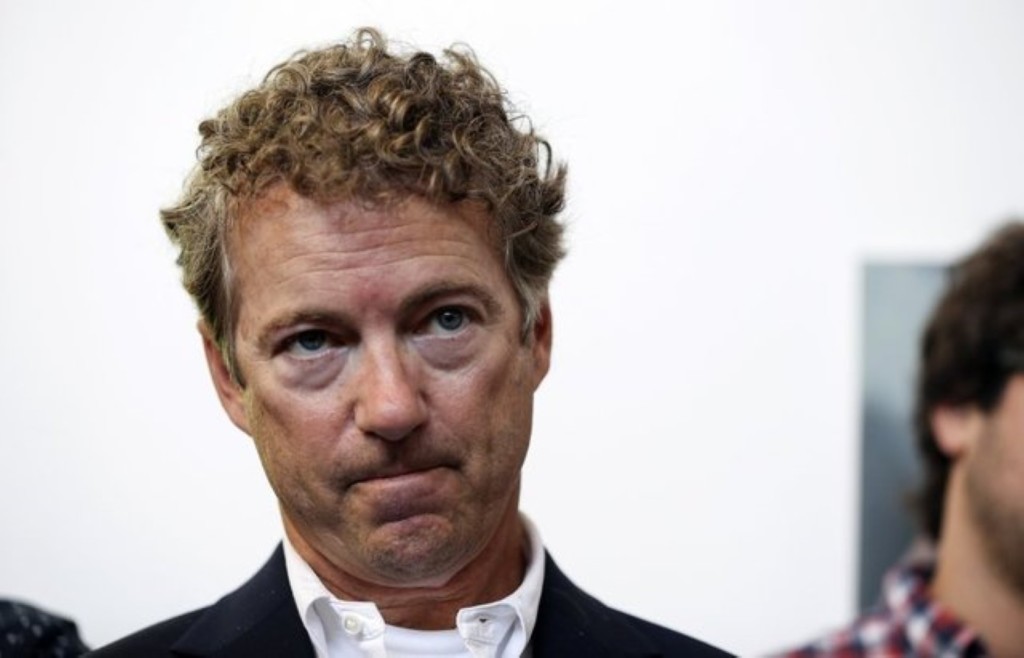
Deep-pocketed libertarians are giving big to help Rand Paul win the Republican presidential primary. Three super PACS supporting the libertarian-leaning Kentucky senator said they raised a combined $6 million through June 30. That’s on top of the nearly $7 million that Paul’s campaign reported pulling in between his April announcement and the end of last month. “There are some very wealthy libertarians out there, and they’re all going to be hearing from me,” said Ed Crane, president of one of the pro-Paul super PACs, called Purple PAC. “It’s a strong potential base for Rand.” Paul’s top backer so far is Jeff Yass, managing director of high-frequency trading firm Susquehanna International Group, who split a $2 million contribution last month between Purple PAC and another pro-Paul super PAC, America’s Liberty. Yass and Crane know each other through the Cato Institute, a free market think tank in Washington that began in the 1970s with the backing of billionaire energy executives Charles and David Koch. Crane is a co-founder, and Yass is a board member. Joining Yass in the $1 million donor club is George Macricostas, head of a data center company called RagingWire. Those two accounted for most of America’s Liberty’s $3.1 million in fundraising so far this year. A third super PAC, Concerned American Voters, has not yet filed a fundraising report, but its leaders said they’ve raised $1.9 million. Scott Banister, a tech investor in Silicon Valley, is among the donors. Matt Kibbe, senior adviser to Concerned American Voters and former leader of the libertarian activist group FreedomWorks, said Paul is testing the idea that libertarian donors will make a major investment in a candidate, not just a cause. “Libertarians are used to giving to ideas and issues campaigns,” Kibbe said. “Do they make the leap and give to a liberty-minded candidate with a pathway to victory? I think the answer is yes.” Paul is one of an expected 17 Republican presidential candidates, and he’s in the top half of the class for fundraising. Republished with permission of The Associated Press.
In Iowa, Tim Pawlenty’s short campaign still casts a long shadow
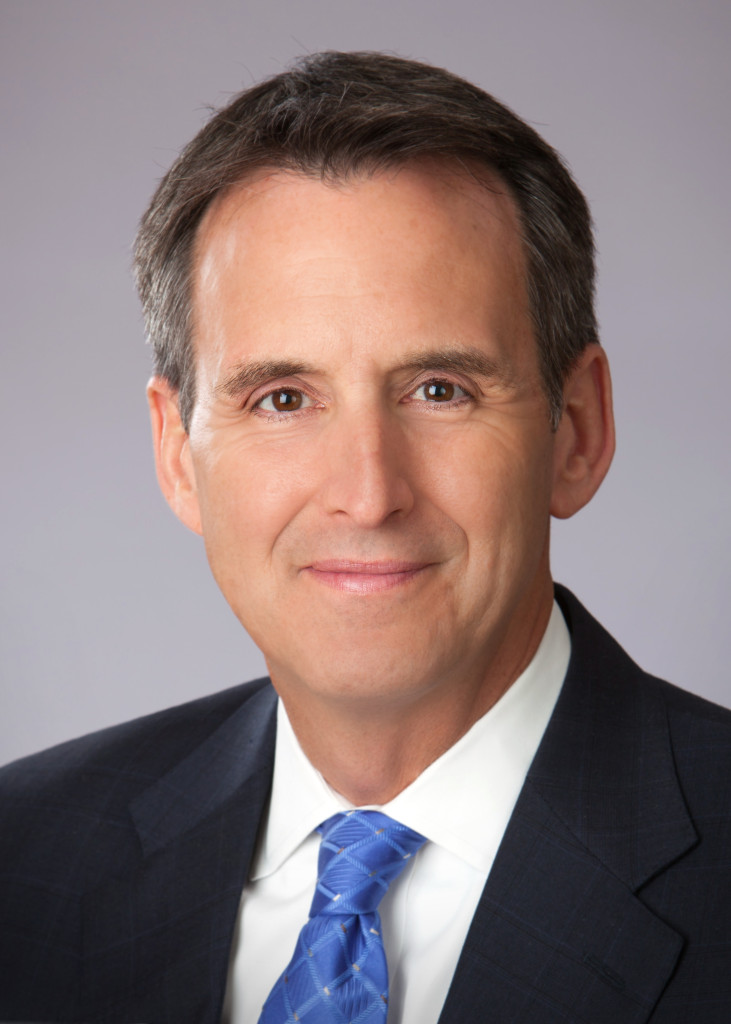
Long before the 2012 Iowa caucuses, Tim Pawlenty was already out of the race for president. Yet his short-lived campaign lives on, casting a shadow over the Republicans now wooing voters in the state that kicks off the White House contest. Four years after Pawlenty staked his presidential bid on Iowa’s traditional summer straw poll, several top Republicans plan to skip the event. Mindful of the outsized resources the former Minnesota governor sank into Iowa, some campaigns aim to run leaner organizations in the state. And they’re also stockpiling money in super PACs, which could help them stay afloat should they suffer a misstep or strategic blunder as Pawlenty did in the first-to-vote state. “You don’t have to spend a ton of dough in the modest-sized state of Iowa to have a result that keeps you going,” Pawlenty said in an interview with The Associated Press in which he reflected on his own missteps and offered advice for those seeking to avoid a similar fate. Friendly and mild-mannered, Pawlenty is well-liked by fellow Republicans. But in Iowa, GOP political operatives now whisper his name as a way to discredit their opponents — and scramble to deflect any comparisons to their own candidate. One of the first Republicans to make clear his plans to run in 2012, Pawlenty never gained the traction in Iowa or nationally that his solid résumé and record suggested he could. After a poor performance in an early debate, he zeroed in on the Iowa GOP’s summer straw poll as the way to save his campaign. Straw polls measure nothing but the sentiments of those who show up, and Iowa’s was a true circus in 2012. Minnesota Rep. Michele Bachmann spent $2 million on the event, going so far as to hire country singer Randy Travis to entertain her supporters. Eventual GOP presidential nominee Mitt Romney didn’t take part, and Pawlenty finished a distant third behind Bachmann and former Texas Rep. Ron Paul. The morning after the straw poll, Pawlenty ended his campaign. Few top 2016 contenders are eager to set themselves up for that kind of embarrassment. Mike Huckabee, the former Arkansas governor who won the 2008 Iowa caucuses, has joined former Florida Gov. Jeb Bush and Florida Sen. Marco Rubio in saying he’ll stay away. “The gig is up on it,” Pawlenty said. “Everybody should just chill out about its significance.” Bush, Rubio and Huckabee all say they plan to compete in the caucuses. Some Iowa Republicans question how aggressively Bush will run in a state where his more moderate positions on immigration and education could be a liability. Iowa operatives also say they’re waiting for Rubio to make more appearances in Iowa. Some note that he’s yet to hire a state director, a key post in a place where detailed knowledge of the caucus process and Iowa’s 99 counties is a coveted commodity. In announcing Rubio’s decision to forgo the straw poll, his communications director, Alex Conant, a veteran of Pawlenty’s 2012 White House run, emphasized the senator planned to run a “lean campaign.” Some straw poll supporters fear they’re watching the demise of an event that has been a tradition since 1979 and a big moneymaker for the state party. “What I don’t see being debated enough or discussed enough is the risk inherent in not participating,” former Iowa GOP chairman Matt Strawn said. “In a field as crowded as we have, non-participation means that you are potentially feeding the opportunity for another campaign to fill the vacuum.” That’s part of the decision facing Wisconsin Gov. Scott Walker, whose advisers say he won’t announce his straw poll plans until he announces his overall 2016 plans in early summer. Walker has already had to swat away Pawlenty comparisons, made based only on the fact both are Midwestern governors with blue-collar backgrounds. Given his strength in early Iowa polls, he risks failing to meet expectations if he competes in the straw poll but loses to weaker candidates. But even if Walker or another top-tier candidate suffers an embarrassing straw poll defeat, it’s unclear whether it would have the kind of debilitating effect it had on Pawlenty. He woke up the next morning suddenly unable to raise money to keep his campaign afloat. With donors able to contribute unlimited cash to super PACs, candidates have a way to stockpile money with independent groups that can run ads and supplement campaign activities. One wealthy benefactor might be enough to sustain a candidate through a rough patch. Super PACs were legal when Pawlenty ran in 2012, but largely untested. Pawlenty recalled a conversation with Romney as both were weighing campaigns in which the eventual 2012 Republican nominee espoused the importance of the big money groups. “I remember thinking I didn’t even know what a super PAC was,” Pawlenty said. The $5 million Pawlenty raised for his campaign looks quaint compared with the staggering figures expected in 2016. Bush, among the most aggressive fundraisers, is expected to pull in $100 million for his super PAC by the time he announces his campaign next week. Pawlenty, who has left politics and is now the CEO of a financial services lobbying firm in Washington, says he regrets many of the decisions he made in Iowa four years ago. He laughs off questions about whether his legacy will be the death of the Iowa straw poll, but says his experience may have been the breaking point for a change that was years in the making. “Maybe my campaign was the capstone,” he said. Republished with permission of The Associated Press.
Jeb Bush, Hillary Clinton on different paths for early fundraising
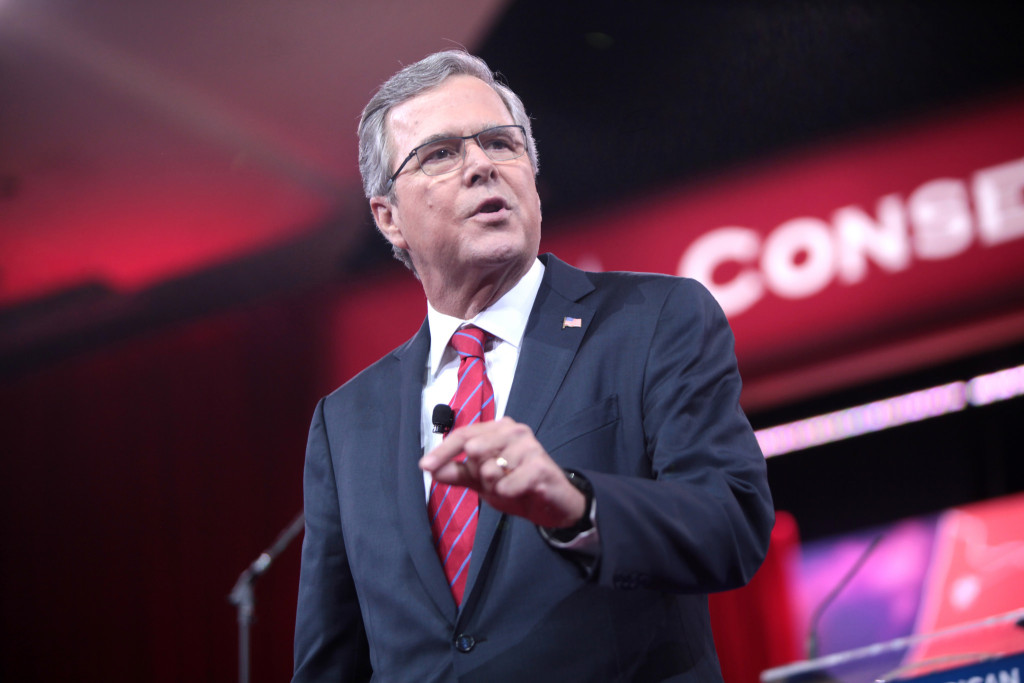
Jeb Bush wants Republicans to know he’s breaking fundraising records. Hillary Rodham Clinton wants Democrats to think she won’t. While many Republicans expect Bush to have raised $100 million by the time he declares his candidacy, Clinton advisers say that’s their modest goal for the entire primary season. The reality is that both campaigns will be flush with high-dollar donors. Bush and Clinton could each pull in more than $1 billion if they become their party’s nominee. But the disparate early signals Bush and Clinton are sending about campaign cash underscore the contrasting ways the heirs to two political families are positioning themselves in the 2016 presidential contest. For Bush, building a fundraising juggernaut is seen as a way to surge ahead of rivals while ensuring he has the money to stay competitive if the race drags on into next spring or summer. The former Florida governor isn’t expected to launch his campaign until at least June, giving him more time to raise money aggressively for his Right to Rise super PAC before he’s legally barred from coordinating with the organization. For Clinton, who so far faces no serious primary competition, lowering fundraising expectations is a bid to dispel the notion that she is her party’s inevitable nominee. She’s holding a smattering of lower dollar campaign fundraisers, with tickets running $2,700 per person, during the next two weeks. Clinton had originally planned to wait until May to start fundraising, but told advisers she was concerned about the prowess of Bush’s money operation and wanted to start sooner, according to a person familiar with the campaign plans. That person was not authorized to discuss the campaign’s plans and insisted on anonymity. Clinton has so far taken no direct action to bolster the Democratic super PAC, Priorities USA Action, nor has she signaled to supporters that they should be funneling money to it. Instead, the Clinton campaign is trying to infuse its fundraising operation with more of a grassroots feel. Top donors are being asked to call and email their contacts, then track their contributions on personalized fundraising pages. There’s a greater emphasis on attracting smaller donors, something President Barack Obama did effectively during his two campaigns. “It’s good politics,” said Ira Leesfield, a Miami lawyer and longtime Clinton financial backer. “If a person sends 100 bucks, 50 bucks, they’re probably going to go out and vote.” Another benefit for skipping opulent fundraising parties? “No one has to hire a caterer,” Leesfield quipped. Bush invited more than 300 donors to Miami’s glamorous South Beach this week for a private two-day retreat at an eco-friendly seaside hotel. Donors received policy briefings from Bush advisers and mingled at a rooftop cocktail party. Bush, who has headlined more than 60 fundraisers this year, told donors he had set a record for Republican political fundraising. Right to Rise doesn’t plan to release any fundraising numbers until July and Bush did not provide donors a figure to back up his assertion. Advisers said Bush was comparing his current totals with the $37 million his brother George W. Bush raised in the first four months of the 2000 campaign, before the era of super PACs and unlimited donations. It appears likely Bush will hit $100 million by the time his super PAC releases figures this summer. While most Republican strategists expect Bush to lead his rivals in the early fundraising race, it’s unclear how significant his advantage will be. Sens. Marco Rubio of Florida, Ted Cruz of Texas and Rand Paul of Kentucky have all displayed fundraising prowess. And some billionaire donors are yet to commit to a candidate. Without the big gang of rivals, Clinton sees little incentive in focusing on fundraising at this stage, at least publicly. Her finance team has set a $100 million goal for the primary and does not plan to take general election money initially. During her failed 2008 race against Obama, Clinton raised $229 million before bowing out of the primary, though some of that money was allocated for the general election. Clinton’s first campaign predated the 2010 Supreme Court decision clearing the way for super PACs to collect unlimited donations. Priorities USA raised about $75 million for Obama’s re-election, significantly less than Republican outside groups. But it attracted attention for aggressive advertisements criticizing Republican nominee Mitt Romney‘s business record, sometimes relying on cheaper online ad buys or free media, rather than purchasing extensive — and expensive — TV time. Priorities USA officials say they expect the organization to keep a narrow focus on television and digital advertisements during the 2016 contest. Bush, meanwhile, is considering a plan that would shift some core campaign functions to his super PAC. Republished with permission of The Associated Press.


